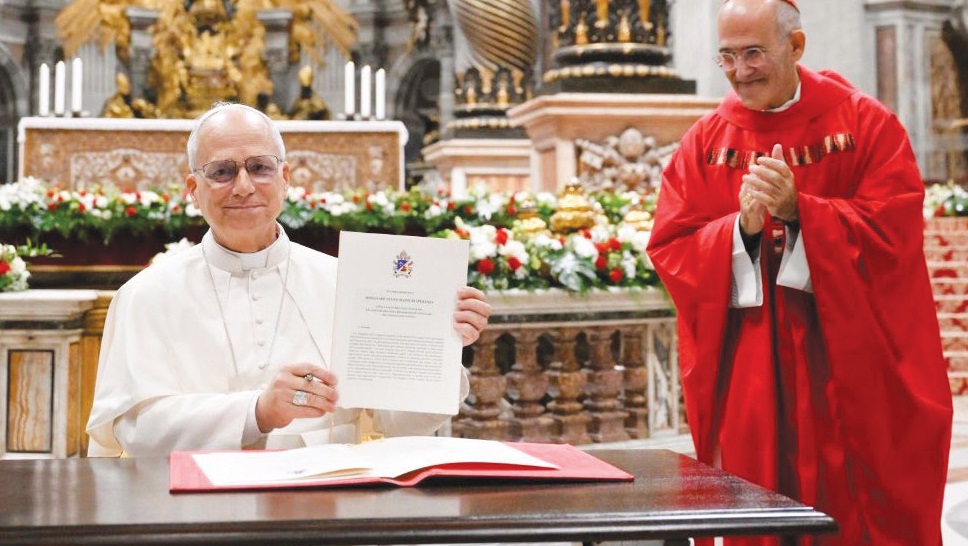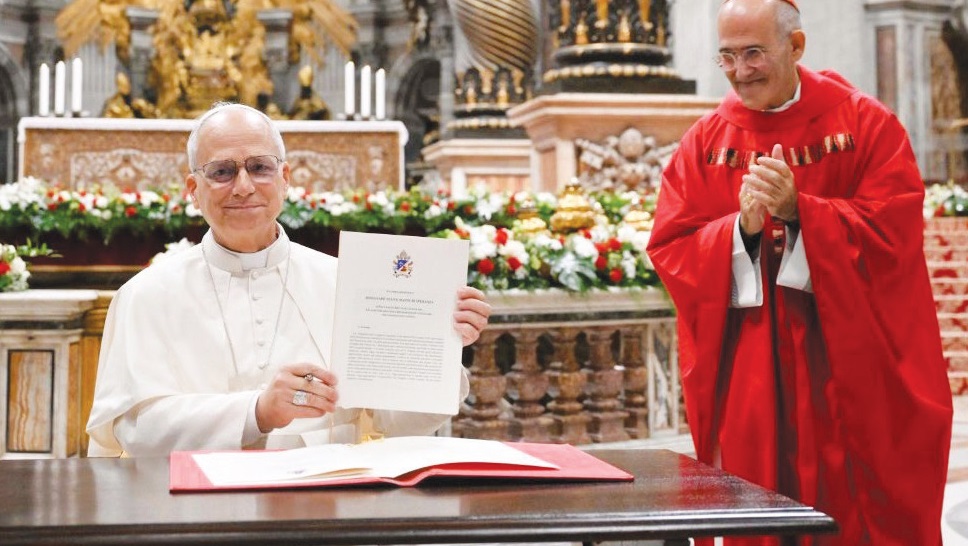Reflecting on the millions of children who still lack access to basic education, and on the crises caused by war, migration, inequality, and poverty, Pope Leo XIV has called the Church to renew her educational mission with courage, creativity, and faith.
Nov 07, 2025

Pope Leo XIV signs his apostolic letter on Catholic education, “Drawing New Maps of Hope,” at the end of a Mass with students from the pontifical universities of Rome in St Peter’s Basilica on October 27, 2025. (Vatican Media)
VATICAN: Reflecting on the millions of children who still lack access to basic education, and on the crises caused by war, migration, inequality, and poverty, Pope Leo XIV has called the Church to renew her educational mission with courage, creativity, and faith.
In his Apostolic Letter Drawing New Maps of Hope, signed on October 27 and released to mark the 60th anniversary of the Vatican II declaration Gravissimum Educationis, the Pope affirms that education remains “one of the highest expressions of Christian charity.”
He writes that, in a fragmented and digitalised age, the insights of the Council continue to inspire the Church to “build bridges” and form persons who unite intellectual rigour with compassion. Education, he insists, “is not an accessory activity, but forms the very fabric of evangelisation,” giving rise to a “firmament of works and charisms” that continue to bear fruit today.
A Living Tradition
Education, the Pope reminds, is a “history of the Spirit at work.” He recalls St Augustine’s image of the true teacher as one who “awakens the desire for truth and freedom,” tracing the Church’s educational heritage from the monastic schools of early Christianity to the Ratio Studiorum of the Jesuits.
He pays tribute to educators such as St Joseph Calasanz, St John Baptist de La Salle, St Marcellin Champagnat, and St John Bosco, who each served the poor and marginalised through innovative methods.
He also honours women who transformed education through their courage and compassion — among them Josephine Bakhita, Maria Montessori, Frances Cabrini, Katharine Drexel, and Elizabeth Ann Seton — whose witness opened opportunities for girls, migrants, and the disadvantaged.
Education as a Shared Mission
Pope Leo XIV describes education as a “choral work” — a shared vocation that brings together teachers, students, families, and society. Naming St John Henry Newman co-patron of education alongside St Thomas Aquinas, he highlights the need for renewal grounded in empathy, openness, and dialogue.
Catholic schools and universities, he says, must form the whole person — “mind, heart, and hands” — integrating knowledge with discernment, justice, and mercy. Questions, he adds, must not be silenced, but guided by trust and accompaniment. Teaching, therefore, is a vocation of service that offers “time, competence, and compassion.”
The Human Person at the Centre
Echoing Pope Paul VI’s warning against reducing education to functional training or economic productivity, Leo XIV insists that every person is “a face, a story, a vocation.” Education, he writes, “measures its worth not by efficiency but by dignity, justice, and the ability to serve the common good.”
The family, he reaffirms, remains “the first school of humanity,” while collaboration among families, parishes, and schools is essential to form consciences capable of choosing what is right rather than what is merely advantageous. “When the Earth suffers,” he adds, “the poor suffer most,” linking social and environmental justice as inseparable elements of Catholic education.
A Culture of Encounter
Building on the late Pope Francis’ Global Compact on Education, the letter identifies three priorities for the years ahead:
• Cultivation of interior life – responding to young people’s thirst for depth.
• A humane digital culture – placing the person before the algorithm.
• Education for peace – “unarmed and disarming,” teaching reconciliation and dialogue.
Education, he writes, “is a gentle force that rejects violence,” a language of mercy that builds bridges, not walls.
Hope for a Fragmented World
Concluding with an appeal to all educators, Pope Leo XIV invites them to “use language that heals,” to keep open hearts, and to face challenges with courage and generosity.
“When education loses sight of the poor,” he warns, “it loses its very soul.” In Drawing New Maps of Hope, the Pope envisions a global educational movement animated by faith, creativity, and compassion— a “symphony of the Spirit” that renews trust, restores humanity, and leads the world once again to hope. –Agencies
